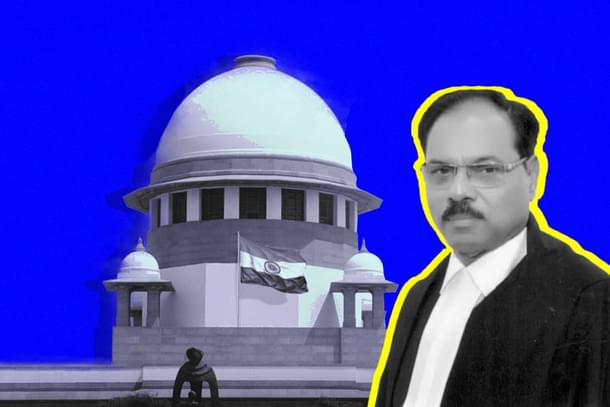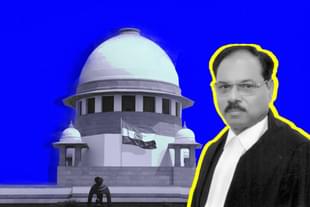Politics
Why The Parliamentary Notice Against Justice Yadav Must Be Rejected
Ayush Anand and Piyush M. Dwivedi
Feb 21, 2025, 01:34 PM | Updated 01:34 PM IST
Save & read from anywhere!
Bookmark stories for easy access on any device or the Swarajya app.


History repeats, prophesied Niccolo Machiavelli, and the politics against Judges remains a recurring stratagem of the politics of opposition in India.
The notice of motion against Justice Shekhar Yadav pending permission before the Chairman of Rajya Sabha is not law but realpolitik.
In 2018, it was Chief Justice Dipak Misra, in 2025, it is Justice Shekhar Yadav.
No Ground Made Out
While the speech of Justice Yadav may remain debatable for its contents, an attempt to invoke the extraordinary power of Parliament to remove him from office is more of optics and political censure.
It is obvious that the speech delivered in the programme relating to Uniform Civil Code had affirmation that “Hindustan will be governed by the wishes of the majority” and a reference to “kathmullah”, an Urdu word indicating extreme religious obsession, but a casual expression and plain-speak in the context of common civil code.
The Judge was assailing the misleading mindset of some sections of the clergy which is the roadblock in materialising the code for gender justice. Any post-truth attribution of communal flavour to his remarks is a political vice that misses the tree for the bush.
Not Text But Context
The allegation levelled in the notice ipso facto is no ground for removal as the well-settled understanding of “misbehaviour” which is inquired into as per the ‘The Judges (Inquiry) Act, 1968’, covers grave instances like corruption and sexual abuse, and never has a remark made by a sitting judge outside court hall has become a ground to remove him from office.
A few words taken out of its context, cannot become the ground for impeachment.
A constitutional scheme cannot be made sensitive to verbal utterances amenable to varying interpretations. It is too pedantic to expect judges to maintain robotic restraint while speaking on legal issues of political significance.
Socio-legal issues cannot be always conversed with bookish precision. Judges are also human beings and any subsequent clarification given by the judge is the best annotation to his own statement. Speech is no judgment.
No Perfunctory Nod
Section 3(1) of the 1968 Act casts a duty on the presiding officer to apply his mind by way of perusing the materials and consulting the persons as he may think fit and thereafter “either admit the motion or refuse to admit the same.”
A purposive interpretation of the act calls for a duty cast on the presiding officer not to permit the introduction of the motion seeking the removal of the judge if it is found an abuse of the process of the house.
Never in history a judge was sought to be removed for a few words employed in a speech on a contentious topic relating to a constitutional mandate.
The Act read with the relevant constitutional provisions makes it abundantly clear that even the presiding officer is conceived as the bulwark of judicial independence, saying nay to defamatory imputations on the floor against a sitting High Court Judge.
As the house proceedings enjoy immunities and privileges under Article 105 of the Constitution of India, the decision of the presiding officer ought to be exercised with abundant caution.
Seized by Supreme Court
As the remarks became controversial, the Collegium of the Supreme Court met the judge in person and no disciplinary action was recommended by the Supreme Court to the government.
Even going by the “In House Procedure of 1998”, the scheme of institutional inquiry under the aegis of the Chief Justice of India, proceedings in parliament are initiated only after the Chief Justice recommends the initiation of proceedings.
Once the Chief Justice of India decided to put the controversy to quietus after ascertaining the facts and law, taking the issue further to parliament is nothing but an attempt to lay political siege to the judiciary and hence necessitate denial by the Chairman. Moreover, it mocks the sanctity of the collegium meeting and the In-House Procedure and serves as a grim reminder to the institutions that fail to fall in line.
Delegitimising the State
It is surprising that the Chairman of the House, whose decision on the notice is still pending, is himself not immune to such excesses, as the opposition recently sought to remove him from office too, alleging bias.
When the individuals holding constitutional offices are consistently put under pressure, they find it difficult to resist the brittle point.
In 2018, when the Chairman of Rajya Sabha refused permission to introduce a motion to remove none other than the then Chief Justice of India from office, the Supreme Court was approached soon after, challenging the statutory discretion exercised by the Chairman, only to be snubbed by the Court which refused to interfere then.
It is a principle and precedent that a remark made by a judge outside the Court cannot be the ground for removal and even in the case of the worst remark in clear and categorical terms, it can only be considered as deviant behaviour which may warrant a rebuke on the administrative side.
Though the facts of the case at hand are different, no stretch of imagination can drag it to Parliament unless abetted by political motives.
Legislative prudence would have put the controversy to rest, once the Supreme Court itself made its mind to opt for a matured quietus. The purpose and spirit of Article 121 bars any discussion on the conduct of a sitting judge of the Supreme Court or High Court on the floor of parliament except on a motion to remove him from office and it forecloses any discussion on the conduct of a judge unless it is an act of misbehaviour or incapacity as contemplated under Article 124(4) and Article 217 (1)(b). And portions of the speech of a judge in a function becoming a reason for the removal is an embarrassment to the scheme of the Constitution.
One may approve or disapprove of the comments in the speech, but the institutions have an obligation to ensure that a sitting judge is not persecuted in the theatre of politics, as the remarks casually stemmed from deliberating on a topic which manifests as a constitutional mandate.
Rejection of the notice is necessary in the best interest of all the institutions that act as constitutional sentinels.
Ayush Anand is an Advocate-on-Record in the Supreme Court of India. Piyush M. Dwivedi is an advocate practising in the Supreme Court of India.





